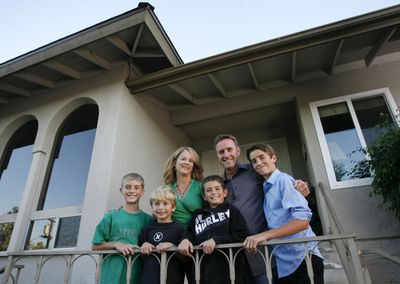Calling it quits
Teen abandonments in Nebraska point to pressures faced by parents

NEW YORK – Yes, you have to clean your room. No, you can’t go to the party. Yes, you have to ride the school bus. GET UP! Patricia Lorenz knows how hard it can be raising teens, and she knows it four times over.
“They fray the apron strings by being obnoxious little twerps,” says Lorenz, whose brood is now grown, out of the house and doing great.
“But that’s their job. I don’t ever remember wishing I could drop them off somewhere.”
In Nebraska, that’s exactly what had been happening under a safe haven law that saw stressed-out parents abandoning children as old as 17.
While the intent of such laws is to allow desperate mothers safe options for unwanted newborns, Nebraska lawmakers initially failed to specify an age limit.
That changed Friday, when Gov. Dave Heineman signed emergency legislation setting an upper age limit of 30 days, similar to several other states.
Raising teenagers – still kids in some ways, but old enough and big enough to think of themselves as in-control adults – can be a frustrating experience far different from any other, parents say.
Unlike the baby years, where there are new parents’ gatherings and relatives eager to come over and help out, the teen parenting years can feel isolating and scary.
Some experts say the parents of teens who turned their kids over to the state probably made a tough choice.
“In some ways what they’re doing is an incredibly noble thing to do,” says Betty Londergan, author of the new book “The Agony and the Agony: Raising a Teenager Without Losing Your Mind” (Da Capo Press, $14.95).
“You can get so sideways with your kids, and to actually reach out for help is an incredibly valiant thing to do, as opposed to hitting them, or worse,” she says.
Londergan, who has a 17-year-old daughter from a previous marriage, and her husband, Larry Schall, moved to Atlanta from Swarthmore, Pa., three years ago.
That made it difficult for Schall to spend regular quality time with his three kids from his first marriage. His son, then in ninth grade, grew increasingly defiant and difficult to control.
After the troubled teen disappeared for nearly two weeks, the family spent thousands of dollars to have him live for two months in a therapeutic wilderness program, followed by an alternative boarding school.
Schall says his son, now 17, is in a far better place.
“I know I am in a very small group of parents that could even consider doing this kind of intervention,” he says. “And now (the boy’s) college savings are gone.
“I would do the same today as I did a year ago. The experience has been transformative for all of us.”
Parents around the country have been closely following the saga in Nebraska.
After the law went into effect in July, more than 30 children were dropped off at state-licensed hospitals. Many were teens and nearly all were older than 10, with some from as far away as Georgia, Michigan and Iowa.
Several parents or guardians who left children in Nebraska reported out-of-control behavior. One mother said she was trying to “scare” her son.
Unemployed widower Gary Staton had, simply, reached the end. He left nine of his 10 children, ranging from a year old to 17, at an Omaha hospital in September.
Staton told Omaha’s KETV: “I didn’t think I could do it alone. I fell apart.”
“Those people are saying, ‘I’ve done the best I can and I can’t do it anymore,’ ” says Dr. Jason Stein, a family therapist in Los Angeles.
“That is a very telling piece of the story. It goes to the humility of being a parent. It’s easy to judge and chastise these people, but they’re actually making a very proactive decision, albeit not necessarily the best one.”
While sympathy runs high for a mom or dad dealing with a colicky infant, a towering teen screaming at a parent in a public place is more apt to bring annoying glares.
“Parents are almost always blamed,” says Dr. Norman Hoffman, a family therapist in Ormond Beach, Fla., and author of the book “Bad Children Can Happen to Good Parents” (VG Press, 2007). “It’s like, ‘What did I do wrong?’
“But there’s hope in every city and every state. It’s just a matter of understanding the ways in which to work with the system. You have to fight, you have to scream and shout for services.”
Stressed-out parents with meager finances, little education or language barriers may have trouble navigating often complicated procedures and paperwork to seek help, either through government agencies or private organizations, Hoffman says.
And shame may hold some of them back, allowing defiant, drug-using or otherwise troubled young people to spin out of control.
Yet Hoffman considers the notion of abandoning an older child “barbaric” and “primitive” when free or low-cost treatment and intervention is available.
Robert Blodgett agrees. At 43, Blodgett owns his own marketing and public relations firm in the San Diego, Calif., area. He calls himself a “father in the trenches” with a 14-year-old son and three younger boys.
“Sure, there are times where I’m just completely exasperated on how to communicate with my son,” he says. “Sometimes I wonder, ‘Who’s home?’
“His room’s always a mess. He forgets things constantly. Many times he’s flat out lazy and can never, ever wake up on his own. It drives me bonkers.
“But I can’t ever imagine a situation wherein my stress level would get that bad.”